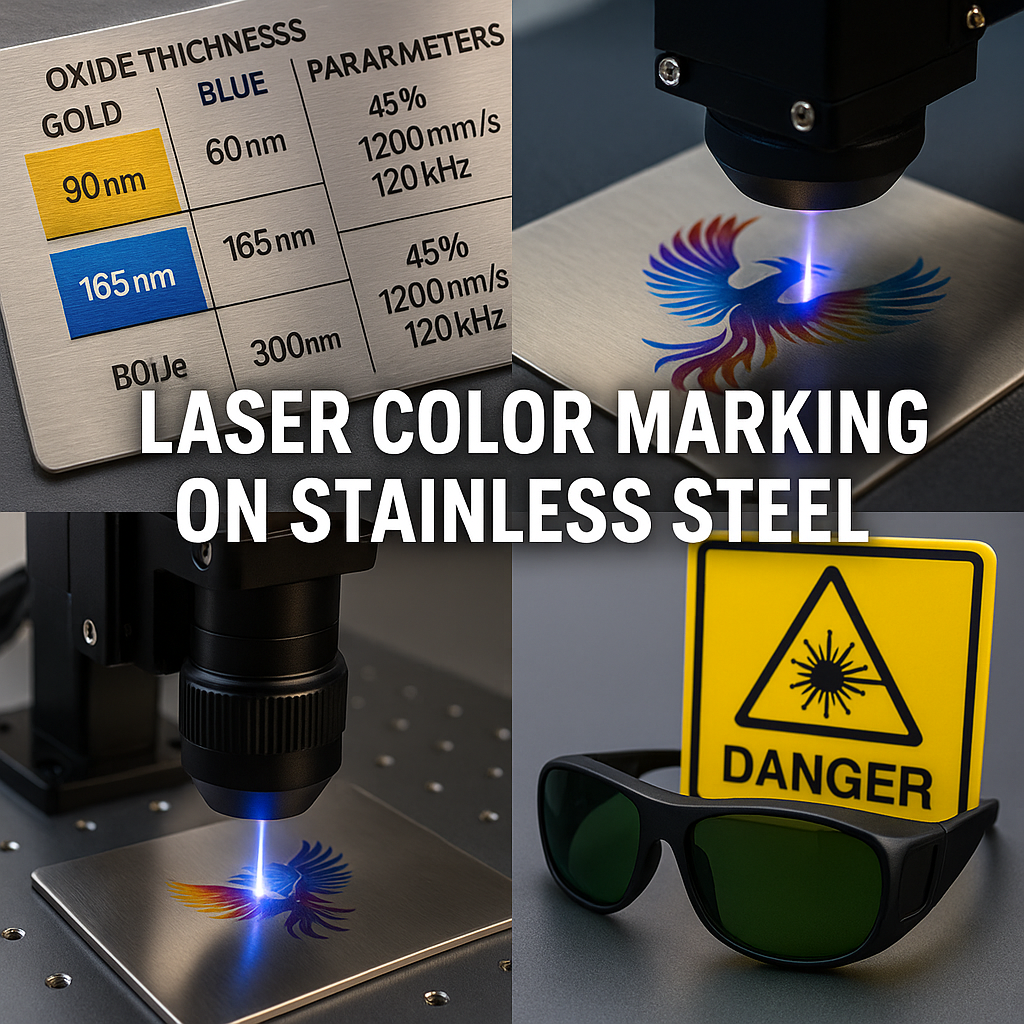A Professional Yet Accessible Resource for Makers and Engineers
The Science Behind Laser Color Marking on Stainless Steel
Laser color marking on stainless steel is a photothermal process where controlled oxidation creates nanometer-thin oxide layers. These layers produce vibrant colors through thin-film interference. This phenomenon occurs when:
- Laser energy heats the metal surface to approximately 800–1500°C
- Atmospheric oxygen reacts with chromium in stainless steel
- The resulting oxide layer thickness (50–300nm) determines the visible color
| Color | Oxide Thickness | Typical Parameters | Applications |
|---|---|---|---|
| Gold | 80–100nm | 60% power, 1000 mm/s, 50 kHz | Jewelry, awards |
| Blue | 150–180nm | 45% power, 1200 mm/s, 120 kHz | Industrial labels |
Equipment Selection Guide
Desktop Laser Comparison
Modern desktop laser systems for home workshops fall into three main categories. One of the most popular is the blue diode laser (450nm):
- Power: 5–20W
- Pros: Affordable ($500–$2,000), compact size
- Cons: Limited to 3–5 basic colors
- Best for: Hobbyists and small decorative projects
Step-by-Step Laser Color Marking Process
Phase 1: Material Preparation
- Clean the surface with isopropyl alcohol (≥99% purity)
- Polish to a mirror finish if possible (Ra <0.4 μm)
- Apply masking tape if creating multi-color designs
Phase 2: Parameter Testing
| Test Pattern | Purpose | Recommended Grid |
|---|---|---|
| Power gradient | Determine melting threshold | 40%–80% in 5% increments |
| Frequency sweep | Identify achievable color range | 20–300 kHz in 20 kHz steps |
Advanced Techniques
Creating Photorealistic Images with Laser Marking:
- Convert images to halftone patterns (50–100 DPI)
- Assign different laser parameters to different dot sizes
- Use dithering algorithms for smooth gradient effects
Technical Note: For the best results, maintain <0.1mm spot overlap and use vector-based processing whenever possible.
Safety Protocols
WARNING: Always wear certified laser safety goggles (OD6+ at the operating wavelength) and ensure proper ventilation. Marking metals produces fumes that require HEPA filtration.
Material Restrictions
- Avoid: Galvanized steel (toxic zinc fumes)
- Safe Materials: 304/316 stainless steel, titanium, anodized aluminum
A Professional Yet Accessible Resource for Makers and Engineers
1. The Science Behind the Colors
Laser color marking on stainless steel is a photothermal process where controlled oxidation creates nanometer-thin layers that produce colors through thin-film interference. This phenomenon occurs when:
-
Laser energy heats the metal surface to 800-1500°C
-
Atmospheric oxygen reacts with chromium in stainless steel
-
The resulting oxide layer thickness determines the color (50-300nm range)
|
Color |
Oxide Thickness |
Typical Parameters |
Applications |
|
Gold |
80-100nm |
60% power, 1000mm/s, 50kHz |
Jewelry, awards |
|
Blue |
150-180nm |
45% power, 1200mm/s, 120kHz |
Industrial labels |
2. Equipment Selection Guide
Desktop Laser Comparison
Modern systems for home workshops fall into three categories:
Blue Diode Lasers (450nm)
• Power: 5-20W
• Pros: Affordable ($500-$2,000), compact
• Cons: Limited to 3-5 basic colors
• Best for: Hobbyists, small decorative items
3. Step-by-Step Process
Phase 1: Material Preparation
-
Clean surface with isopropyl alcohol (≥99% purity)
-
Polish to mirror finish if possible (Ra <0.4μm)
-
Apply masking tape for multi-color designs
Phase 2: Parameter Testing
|
Test Pattern |
Purpose |
Recommended Grid |
|
Power gradient |
Determine melting threshold |
40%-80% in 5% increments |
|
Frequency sweep |
Color range discovery |
20-300kHz in 20kHz steps |
4. Advanced Techniques
Creating Photorealistic Images:
-
Convert images to halftone patterns (50-100DPI)
-
Assign different parameters to dot sizes
-
Use dithering algorithms for smooth gradients
Technical Note: For best results, maintain < 0.1mm spot overlap and use vector-based processing when possible.
5. Safety Protocols
WARNING: Always wear appropriate laser safety goggles (OD6+ at operating wavelength) and ensure proper ventilation. Metal fumes require HEPA filtration.
Material Restrictions:
-
Avoid: Galvanized steel (toxic zinc fumes)
-
Safe: 304/316 stainless, titanium, anodized aluminum




